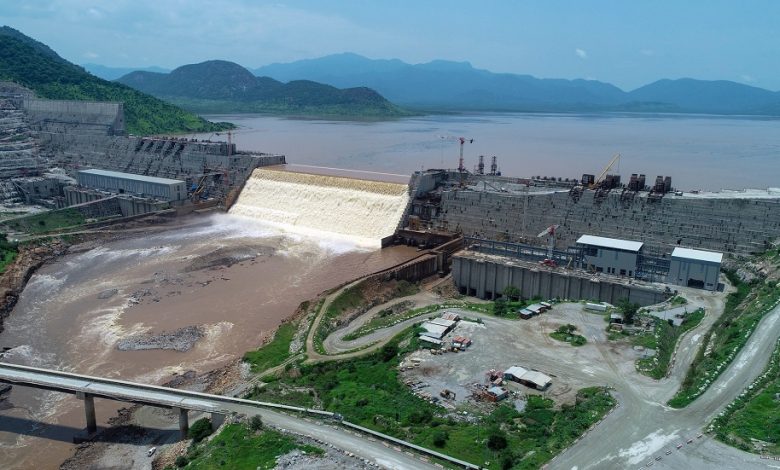Egyptian Prime Minister in Ethiopia… Will the (GERD) Issue Move Forward?

The participation of Egyptian Prime Minister Mostafa Madbouly, leading his country’s delegation at the African Union (AU) summit in Ethiopia, raises questions about whether this visit could help resolve the ongoing dispute between Cairo and Addis Ababa over the Grand Ethiopian Renaissance Dam (GERD).
Despite Egypt’s high-level representation at the summit in Addis Ababa, experts believe that Madbouly’s visit to Ethiopia will not significantly impact the current crisis surrounding the dam, as it is not on the official agenda of the African leaders’ meetings. However, they note that Egypt’s water security issue is likely to be discussed during Madbouly’s bilateral talks.
The GERD, built by Ethiopia on the main tributary of the Nile, has faced opposition from Egypt and Sudan. The three countries have been negotiating for nearly 13 years without reaching an agreement on the dam’s operation rules.
Cairo holds Ethiopia responsible for the failure of the negotiations. In a letter sent by the Egyptian Ministry of Foreign Affairs to the United Nations Security Council last September, Egypt accused Addis Ababa of seeking to prolong negotiations indefinitely to impose a fait accompli, without any real political will to reach a solution.
Madbouly is leading Egypt’s delegation to the AU summit, which takes place on Saturday and Sunday in Addis Ababa, with the participation of African heads of state and government, according to the Egyptian Cabinet.
The summit’s agenda includes elections for leadership positions in the AU Commission, discussions on peace and security, the role of the AU in conflict resolution, economic integration, and mechanisms for implementing the African Continental Free Trade Area. The summit was preceded by a meeting of the AU Executive Council (comprising foreign ministers) on Wednesday and Thursday to prepare for the summit discussions.
During the Executive Council meeting, Egyptian Foreign Minister Badr Abdel Aty emphasized the need for African solidarity and joint action to address challenges such as peace and security, water scarcity, climate change, and migration.
Limited Expectations for Progress on the GERD Issue
Ahmed Haggag, former Assistant Secretary-General of the Organization of African Unity, does not expect any progress on the GERD issue during Madbouly’s visit to Ethiopia. He stated that the primary purpose of the visit is to participate in the AU summit, and the dam issue is not on the agenda of the African leaders’ meetings.
However, Haggag pointed out that Egypt’s absence from the summit’s agenda does not mean that Cairo will not reaffirm its water rights. He told Asharq Al-Awsat that Egypt remains firm in its position on the GERD issue and insists on a legally binding agreement governing the dam’s operation and management. Egypt consistently raises its water security concerns in international forums, most recently during talks between the Egyptian foreign minister and U.S. Senator Marco Rubio in Washington.
During his meeting with Rubio last Monday, Abdel Aty reiterated Egypt’s firm stance on the need for a legally binding agreement on the operation of the Ethiopian dam that does not infringe on the rights of downstream nations, according to the Egyptian Ministry of Foreign Affairs.
Earlier, Ethiopian Prime Minister Abiy Ahmed announced the “completion of the dam project” and stated last August that the total water volume in the dam’s reservoir would reach 70 billion cubic meters by December.
Egypt’s Approach to the GERD Issue at the AU Summit
Egypt’s discussion of its water security concerns at the AU summit will not be framed as a formal complaint against Ethiopia, according to former Assistant Foreign Minister Mona Omar. She explained that Egypt prefers to address the GERD issue through bilateral discussions with African nations rather than within the collective African framework.
She told Asharq Al-Awsat that Egypt’s participation in international organizations like the AU always reinforces its consistent stance on water issues, emphasizing respect for international law and shared development among Nile Basin countries.
Egyptian Foreign Minister Abdel Aty also reaffirmed Egypt’s firm stance on its water rights, describing the issue as a matter of national survival. During talks in Berlin with EU Special Representative for the Horn of Africa Annette Weber on Friday, he stressed the need for adherence to international law principles in managing water resources fairly and equitably to safeguard the rights of all parties.
According to Omar, Egypt has other pressing issues to address at the AU summit, including securing African support for the Palestinian cause, opposing forced displacement in Gaza, developments in the Sudanese conflict, Egypt’s efforts to reinstate Sudan’s AU membership, and regional concerns related to Libya, the Horn of Africa, and the Red Sea.
However, Egyptian expert on African affairs Rami Zehdi believes the AU summit provides an opportunity for the Egyptian delegation to highlight the GERD issue within the broader discussions on peace and security, which include water security. He noted that while the dam issue may be discussed in a general context, it is unlikely to lead to direct negotiations between Cairo and Addis Ababa.
Zehdi added that water security will be a key topic in Madbouly’s bilateral meetings with African delegations, where he will stress Egypt’s concerns on the matter. Speaking to Asharq Al-Awsat, he pointed out that many African nations face challenges related to water scarcity and climate change, making these issues central to discussions at the AU summit.
Water Security: A Vital Issue for Egypt
Egypt views its water security as an existential issue. The country faces a water deficit of 55%, relying almost entirely on the Nile for 98% of its water needs, with an annual share of 55.5 billion cubic meters. Egypt currently falls below the global water poverty line, with per capita water availability at just 500 cubic meters per year, according to the Egyptian Ministry of Water Resources and Irrigation.



